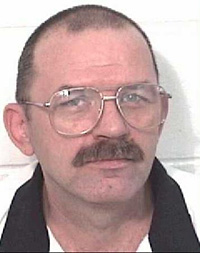
|
 |
 |
 Americas & Beyond | May 2008 Americas & Beyond | May 2008  
Parole Board Holds Hearing for Convicted Killer
 Shannon Mccaffrey - Associated Press Shannon Mccaffrey - Associated Press
go to original


| | William Earl Lynd is seen in an undated prison photo. The U.S. state of Georgia has scheduled the execution of Lynd, a convicted murderer, on May 6 or soon afterward, in what will likely be the first use of lethal injection since a U.S. Supreme Court ruling that ended an effective moratorium on capital punishment. (Georgia Department of Corrections/Reuters) | | |
Atlanta — A convicted Georgia killer pleaded Monday for a stay of execution, hoping to avoid becoming the first inmate put to death since the U.S. Supreme Court found lethal injection constitutional.

William Earl Lynd is scheduled to die at 7 p.m. Tuesday for fatally shooting his live-in girlfriend, Ginger Moore, two days before Christmas in 1988. His lawyer asked both the Georgia Supreme Court and the Georgia Board of Pardons and Paroles for a 90-day stay of execution, and a commutation of his sentence.

Attorney Tom Dunn has argued that medical testimony presented at Lynd's 1990 trial was unreliable and the jury that sentenced him to death never learned of a possible mitigating factor: He had been sexually molested by neighbors at age 8.

Dunn made his case to the parole board behind closed doors for about two hours Monday. He declined to comment after the hearing. Prosecutors were expected to make their case Monday afternoon, and the board's decision was expected by the end of the day.

If the parole board or courts do not intervene, Lynd's execution would be the first since the U.S. Supreme Court last month upheld Kentucky's lethal injection protocol, clearing the way for executions to resume in the roughly three dozen states that use that method.

Prosecutors at Lynd's trial said Moore suffered a slow agonizing death, regaining consciousness twice after successive gunshot wounds to the head at the home she and Lynd shared in Berrien County, in south Georgia. The medical examiner testified that Moore was still alive when Lynd stuffed her into the trunk of her car and took a drive. Lynd confessed to authorities that when he heard her thumping around in the trunk, he opened it and fired the final lethal shot.

The allegation that Lynd kidnapped Moore before she died was an essential "aggravating" circumstance that made him eligible for the death penalty. It also helped prosecutors show the slaying was premeditated.

But Lynd's lawyers argue the medical examiner who did Moore's autopsy was not a physician and was wrong in asserting that she would have been able to regain consciousness after the second shot.

A doctor hired by the defense to examine the evidence found that Moore did not survive the second gunshot wound and was already dead when she was placed in the trunk, making Lynd innocent of the kidnapping charge. The original medical examiner, Warren Tillman, now agrees it is unlikely she was alive when placed in the car, according to Dunn's legal filing.

Dunn said Lynd and Moore had consumed Valium, alcohol and marijuana and were in a heated argument over a trip to Florida when he shot her.

"This crime was hot blooded and without premeditation," reads Dunn's application to the parole board. "Tragic — yes. Cold blooded — no."

Meanwhile, a Mexican-born Texas prisoner whose death sentence set off an international dispute and a U.S. Supreme Court rebuke of the White House, also received an execution date Monday.

Texas State District Judge Caprice Cosper set the Aug. 5 lethal injection for 33-year-old Jose Medellin for his participation in the gang rape and strangulation deaths of two teenage girls 15 years ago in Houston when they stumbled upon a gang initiation rite.

The Supreme Court in March refused to hear Medellin's appeal, saying President Bush overstepped his authority by ordering Texas to reopen his case and the cases of 50 other Mexican nationals condemned for murders in the U.S. Texas refused to comply.

Medellin is among 14 native Mexicans on death row in Texas. Mexico has no death penalty and sued the United States in the world court in 2003. Mexico and other opponents of capital punishment have sought to use the world court to fight for foreigners facing execution in the U.S.

Associated Press writer Michael Graczyk in Houston contributed to this story. | 
 | |
 |



